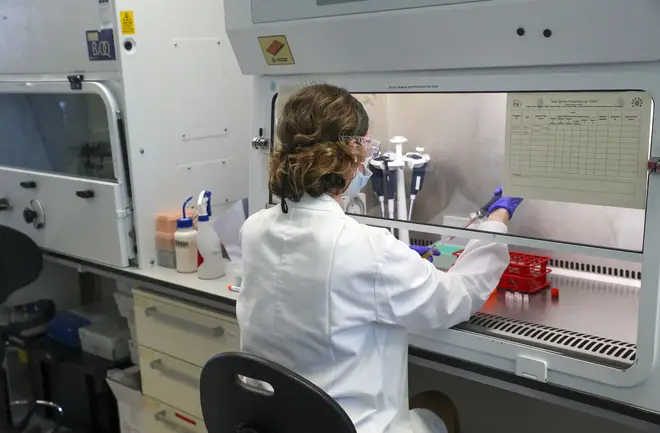
Ian Payne 4am - 7am
20 July 2020, 16:43 | Updated: 20 July 2020, 17:16

Richard Horton, Editor-in-Chief of The Lancet on Oxford vaccine news
As trials show the Oxford vaccine to trigger immune response to coronavirus, this journalist insisted we can be "encouraged that this vaccine could be effective" against Covid-19.
Results published in medical journal, The Lancet have shown that Oxford vaccine trials have found a sample that is "safe and creates an immune response" – signifying a major step forward in our battle against the pandemic.
Editor-in-Chief of The Lancet Richard Horton joined Shelagh Fogarty to discuss the momentous news. "The Oxford Covid-19 vaccine was studied in over 1,000 individuals in the United Kingdom and it's been found to be safe, well tolerated and induces, I would say, a strong immune reaction."
"There are two critical parts of the immune reaction that need to be stimulated, and this vaccine candidate stimulates both of those very effectively" Mr Horton revealed, adding scientists can now "go forward to what we call phase three clinical trials feeling very hopeful, very encouraged that this vaccine could be effective."
Shelagh wondered if Mr Horton thought "the messaging should include good explanations of precisely what's happening in the body," to fight against false information around vaccines.
"This is honestly my biggest fear" said the Editor-in-Chief, "that we go through another anti-vaxx moment in this country. This virus is a killer, let's be very clear."

"If we get this vaccine through clinical trials and it's proven to be effective, we all need to take it and this is I hope, what people understand. If we're going to stop this pandemic in its tracks, a vaccine is the only way forward."
Mr Horton concluded that "we need to start preparing the public for a vaccine right now." He added that the report is available to be dissected by the public if they so wish, telling listeners that "it's fully transparent, people can be very confident and trusting in this particular Oxford group, and we should be very grateful to them."
Mr Horton was clearly excited after being given the floor by Shelagh, who nudged him into explaining how the vaccine will work.
"You take a common cold virus" he began, "you put a piece of, only a tiny tiny part of the SARS virus into the genetic material of this virus and then when you inject it our bodies' cells take this up and start producing a tiny piece of the SARS virus which is perfectly safe."
Through this, The Lancet chief said that after taking the vaccine "if you are exposed to the virus, it doesn't affect you."
Listen & subscribe: Global Player | Apple Podcasts | Google Podcasts | Spotify
Compared with the control group of those given a meningitis vaccine, the Covid-19 vaccine caused minor side effects more frequently, according to the study.
Researchers said paracetamol was sufficient to manage the side effects, adding that there were no serious adverse events from the vaccine.
Mr Horton posted on Twitter: "The phase 1/2 Oxford COVID-19 vaccine trial is now published. The vaccine is safe, well-tolerated, and immunogenic. Congratulations to Pedro Folegatti and colleagues. These results are extremely encouraging."
Professor Sarah Gilbert, of the University of Oxford, said: "There is still much work to be done before we can confirm if our vaccine will help manage the Covid-19 pandemic, but these early results hold promise.
The phase 1/2 Oxford COVID-19 vaccine trial is now published. The vaccine is safe, well-tolerated, and immunogenic. Congratulations to Pedro Folegatti and colleagues. These results are extremely encouraging. https://t.co/oQp2eoZYIg
— richard horton (@richardhorton1) July 20, 2020
"As well as continuing to test our vaccine in phase-three trials, we need to learn more about the virus - for example, we still do not know how strong an immune response we need to provoke to effectively protect against Sars-Cov-2 infection.
"If our vaccine is effective, it is a promising option as these types of vaccine can be manufactured at large scale.
"A successful vaccine against Sars-Cov-2 could be used to prevent infection, disease and death in the whole population, with high-risk populations such as hospital workers and older adults prioritised to receive vaccination."